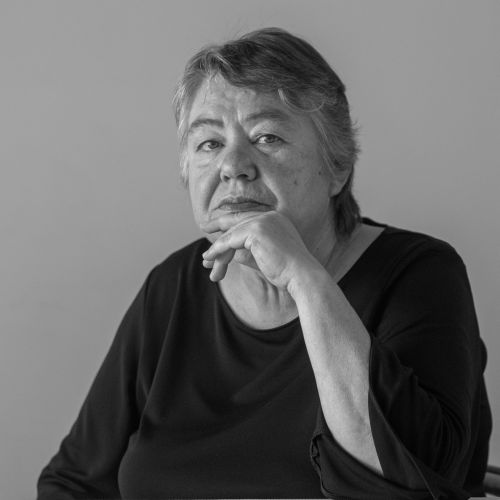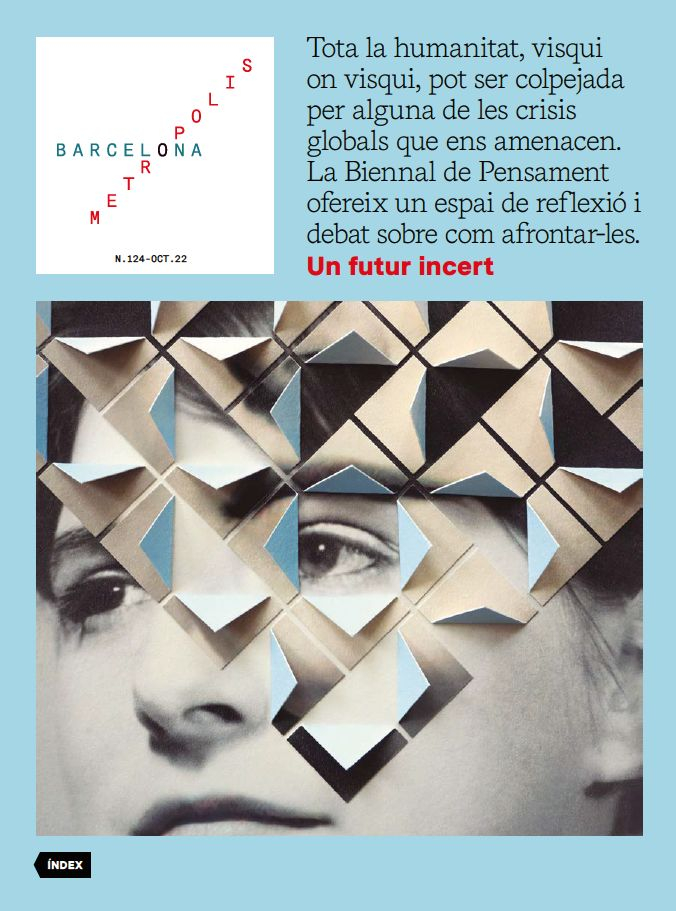“I think that the fear of death is what brings me to make films”
- Interview
- Oct 22
- 18 mins
Carla Simón

In Estiu 1993 (Summer 1993), Carla Simón fictionalised her experience of being adopted by her aunt and uncle when she was six years old, following the death of her parents from AIDS. A marvel of a film that, in 2017, plainly revealed her sensibility as a filmmaker. Five years later, and after having had to postpone filming because of the pandemic, she has proven her talent with Alcarràs, an ode to small farmers (a world that is dying out) with which she perseveres in a style of filmmaking: the film starts out from a very detailed script and opens up to reality, with all its unexpected and random turns. Simón recognises that she wants to be in control of everything, but she also wants what unfolds in front of the camera to be brimming with life and truth. She claims it’s about striking a balance between rigidity and fluidity.
Carla Simón Pipó (Barcelona, 1986) grew up in Les Planes d’Hostoles (La Garrotxa) after her parents died and she was adopted by her maternal aunt and uncle. She turned her adaptation to her new family into a narrative film, Estiu 1993 (2017), which earned several awards, including the City of Barcelona Audiovisual Award and the Gaudí Award for Best Director. Previously, Simón studied Audiovisual Communication at the UAB and, among other qualifications, she holds a Master of Arts from the London Film School. In London, she made three short films: the documentary Born Positive (2012) and the fiction films Lipstick (2013) and Las pequeñas cosas (Those Little Things, 2014). For her second feature film, Alcarràs, she received the Golden Bear at the last Berlin International Film Festival. The film deals with the real difficulties small farmers come up against, which she learned about through the family of her adoptive mother, a resident of the town of El Segrià to which the title of the film refers.
Carla Simón and I agreed that I would interview her on the day Alcarràs was presented at the Truffaut in Girona, a cinema she loves because, as a teenager, she often went there with her uncles from Les Planes d’Hostoles. The event came at the end of a week full of other emotional presentations (particularly in Lleida, but also in Barcelona) and interviews. Carla Simón was pleased, still in the state of elation that erupted on winning the Golden Bear at the Berlin International Film Festival, but exhausted. Sitting on a chair, she clutched her belly with her hands: “Manel’s a bit jumpy with so much going on”. After she told me that, although she was over seven months pregnant, she hadn’t been able to say no to a number of things, it dawned on me to ask her why she made films.
Why do you make films?
I don’t know if this can be answered outright. At least I can’t. But I will say one thing: I think it’s because of the fear of death. Anyway, studies have apparently shown that people who experience death at close hand at a young age are particularly creative. This awareness of death makes you want to leave your mark. When you have experienced it so closely, you feel it forever. It’s the need not to leave this world without leaving something of yourself. I don’t know if it’s a self-centred attitude, but it brings out a longing to pass something on, to leave something behind that transcends you. And culture makes this possible, which is what remains, with any kind of art.
Even so, why did you choose cinema? I ask this since it can be so influenced by the industry that there are those who say that, only occasionally, something artistic emerges.
The truth is that I wonder about that too. It’s hard to make films and to make them the way you want to. Getting a project off the ground takes a great deal of effort. Everything proceeds really slowly and lots people need to be involved. At times I think I’ve made a mistake. I thought about it during my three-month stay in Rome because, given that one of the producers of Alcarràs is Italian, the editing had to be done there. I saw lots of painting. It was an aesthetic experience, but I also thought: those who painted these works didn’t need any of the things required to make a film and could control how they made them.
They may also have had to fulfil commissions and therefore the demands of those who paid for them.
Possibly. But they certainly didn’t have to deal with something as complicated as filming. To get to that point, you have to secure financing. And you have to do a lot of preparing: writing the script with all the filters it has to go through, casting, creating the conditions for filming... I fret when I’m filming, because you don’t have all the time in the world and, not being able to backtrack, lots of things don’t turn out as you’d planned.
The unexpected can be wonderful. Agnès Varda made this statement, who you mentioned you met...
Yes, it really touched me. I was lucky enough to sit next to her at a dinner organised by the Cannes Film Festival in 2018, a few months before her death. I had the opportunity to meet her not only as a very liberated and innovative filmmaker who has blazed many paths, but also someone who started making films when there were very few women directors and who has helped those of us who have come after her.
She said that, at the outset, she felt like the exception to the rule. Fortunately, the situation has changed. In Catalonia itself, new filmmakers with undeniable talent are emerging.
The situation has changed, but it has been tough, and there is still a long way to go for the number of female directors to catch up with that of male directors. And it’s still difficult for us to get selected for the major festivals, even though all of the awards have been won by women in the last year. But we are here (in the filmmaking world) to stay. And, yes, I am proud to be part of a generation of Catalan female filmmakers who have made different films that have earned accolades.
Varda said that chance was her greatest ally and that, if you open yourself up to it, it grants you many gifts. In fact, I get the impression that Alcarràs, like Estiu 1993, is a very detailed film in terms of the script, but that it takes advantage of the actors’ spontaneous actions, who not only embody, but also bring what is written to life.
It’s true. Many good things happen thanks to chance, but you have to be able to spot them. Sometimes they happen and you don’t realise it until the time comes for editing. It’s a surprise that makes you realise that you certainly have to open yourself up to chance. In my case, however, I am a control freak. And being open to chance is a learning process. In Estiu 1993 we shot 35 hours of film. We managed to shoot 90 hours to edit Alcarràs. I think I still have to learn more to observe what happens in front of the camera. And not only to make sure that it unfolds as I have imagined it, but to be open to what happens. Anyway, because I’m “a total control freak”, I try to shoot the script as it’s written. Still, I also want what happens in front of the camera to be brimming with life and truth.
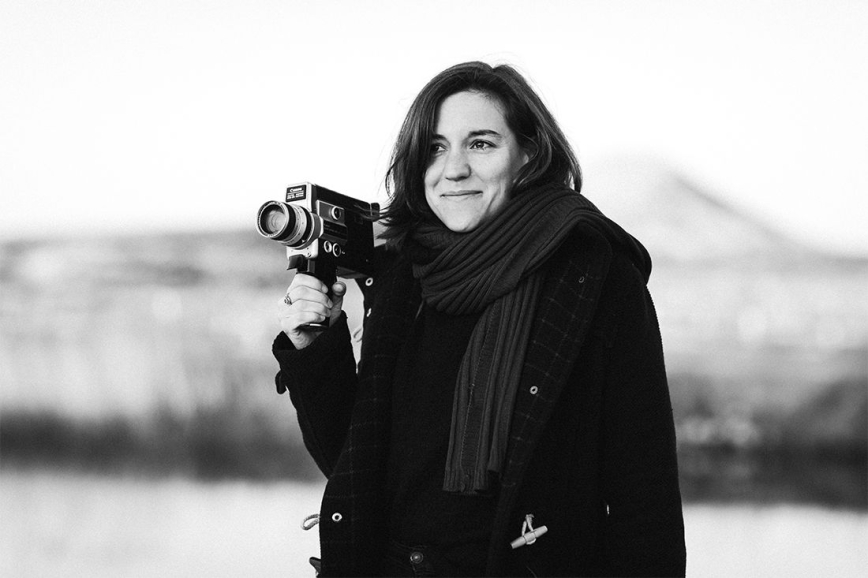 Portrait of Carla Simón. © Xavi Rué
Portrait of Carla Simón. © Xavi RuéI remember a text by Olivier Assayas, who argues that there are filmmakers who like to be “in control” and others who “let themselves go”, exemplified by Hitchcock and Renoir respectively. The former do not allow the world to filter in through chance. The latter open themselves up to the world as it is. Your films move between one and the other.
When I was shooting Alcarràs I realised that, when I tried to stage the script meticulously, there were scenes that didn’t flow. In the first take, it was generally rigid. Then, as we all became more relaxed in our roles, it became more natural. However, if we ever tried what would come out saying “do as you please”, the outcome was awful. One thing is not having to tell people who have been doing it all their lives how to pick peaches. But it’s another thing to make these “natural actors” act out a scene with no direction or guidance. Something unexpected would emerge, but it wouldn’t be amusing. As we said, it’s about striking a balance between rigidity and fluidity. Obviously, you don’t always get it right. Just as you come across hidden treasures and lucky mistakes, when editing you discover scenes that don’t work. In any case, while shooting, you have to be patient; you have to know how to wait for what you didn’t expect to happen.
I have read that one of the film’s references is Italian neorealism, especially Rossellini, for whom cinema is the art of waiting. Some of us already consider that Estiu 1993 has an air of Rossellini, an attention to reality that suddenly has a revelation, a tension to make us see the invisible within the visible: whether it is the interior of a character or the hint of the mysteries of the world that can both astonish and unsettle us.
It may have already existed intuitively, but with Alcarràs I have become more aware of its existence. My contradiction is that I want to ‘be in control’ of everything through the film script, but I keep in mind that one of the most magnificent moments in cinema is the tuna fishing in Stromboli. In the film, Rossellini tells a fictional story about a woman (Ingrid Bergman) who, having married a fisherman on the island of Stromboli to escape from a refugee camp after the Second World War, feels lost, alone and rejected on the island. But it turns out that, while making the film, Rossellini found out that a shoal of tuna was approaching the island and that the fishermen were preparing their nets. And he filmed it as a documentary that he wove into the story. That’s what it’s like to be there.
And having the rod at the ready. Continuing with Rossellini, I am also reminded of the end of Journey to Italy, in which the leading couple, in a time of crisis, reconcile while the procession of San Gennaro in Naples is taking place. Fiction “entered” the procession without altering its course. As a matter of fact, you get the impression that the fiction is altered by the reality that unfolds, as if it made the “miracle of reconciliation” happen.
In fact, I intended to visit markets to find the extras, but to film them as they were, and I was thinking of doing it at real festivals in villages in the area, El Segrià and El Pla d’Urgell. However, the pandemic broke out, which not only postponed the filming, but also altered, affected and even prevented certain ideas from being brought to fruition. I wanted to film in markets and at festivals to capture the real atmosphere. How can it be recreated by making it feel like it’s really happening? We were fortunate that people were very much in the mood to celebrate, which is one of the upshots of the pandemic that has wreaked so much havoc. So the film gave them an excuse to party and they gave it their all, especially the young people, who danced until they dropped.
In this globalised world, there seems to be a resurgence of popular culture, linked to the local which at the same time connects with the universal. There are music groups that draw from the popular tradition. I illustrate this with Maria Arnal and Marcel Bagés because one of their songs, Jo no canto per la veu, has the same tune as La cançó del pandero that the grandfather (Josep Abad) and the little girl Iris (the charming Ainet Jounou) sing in Alcarràs.
That’s how it is. Let’s say that Arnau (Vilaró), a friend and co-writer of the film, and I combined La cançó del pandero (which was performed in the past during Corpus Christi, and which country women incorporated, improvising, while they worked, for example, harvesting the fruit) with lyrics inspired by the songs of reaping and threshing. Alcarràs also connects with some recent Catalan literature set in the countryside, especially books that pay attention to how certain ways of life are dying out.
Yes, that’s true. After seeing the film, I read Tríptic de la terra (Triptych of the Land), by Mercè Ibarz, and I thought that they are closely related. They pick up on the difficulty for small farmers to continue farming the land. It’s a whole world that is coming to an end.
We have also make reference to legends. I was delighted to mention the one about a marchioness who, after losing her fortune, is forced to beg and discovers that walnuts are delicious: she had so many walnut trees on her land and she ends up surviving on walnut bread given to her by former servants. Whenever we ate walnuts, my mother and Aunt Maria told that one to me: the marchioness went bankrupt because she only ate the marrow from lamb ribs. In Alcarràs, Aunt Paquita (Antònia Castells) explains to the children that she ate beef marrow: “This is for Margarita the cow that the Solé family has. As a tribute...”.
I was told that she was the marchioness of Formançó castle. The one in Alcarràs is the Marchioness of Tornabous.
This is the name Arnau and I found in a book of legends. In any case, I am glad that, with all the variations there are, so many people recognise things that speak to their experiences, their memories.
Watching Alcarràs, we might be reminded of The Grapes of Wrath, Ford’s film based on the novel by John Steinbeck. The film tells the story of how a family in Oklahoma, at the time of the Great Depression in the United States, must leave their farm because dust storms damaged the crops and they cannot repay the bank loan. The family members move to California, where, through much hardship, they come to work as strikebreakers in a peach orchard. It isn’t exactly the same, but the Solé family, without having to leave their home, also loses some land: the land on which they have grown peaches for three generations.
First of all, I’ll say that we had westerns in mind because the lands in the west of Lleida are the Catalan Far West. And it may remind us of The Grapes of Wrath. We are also in times of crisis, with all the difficulties facing small farmers to survive. But Alcarràs may be even more closely related to a film by Elia Kazan (Wild River, 1960), which also takes place at the time of the Great Depression and the New Deal policies, set in in the southeast, specifically in Tennessee, where Montgomery Clift arrives to take charge of the building of a dam to contain the river’s floods. This involves confiscating land and evicting those who remain who, clinging to the place where they live and accustomed to facing all kinds of adversity, object to the construction. Which side is right? Both. One wants to build the dam to prevent catastrophes. But one can also understand those who do not want to leave the land. Sometimes two valid options can clash. And this is related to Alcarràs because we did not want to offer our dear farmers an easily reprehensible, contemptible option (an “enemy”). The peach trees will be uprooted to install solar panels, that is, an alternative form of energy that we believe is necessary.
 Portrait of Carla Simón. © Ferran Forné
Portrait of Carla Simón. © Ferran FornéNevertheless, the landowner wants nothing to do with the handover that one of his grandfathers made to a Solé ancestor because he saved his skin during the Spanish Civil War: I think he relinquished it, but didn’t sign it over, because, after all, he was a victor in the war who, for that very reason, could hold onto his property. The Solé grandfather can go on saying that his family and the Pinyol family were great friends: the class difference is there and the land is not theirs. This is how the young Pinyol man (Jacob Diarte) throws them out to join a now lucrative business.
I don’t deny certain things you say, but it’s not entirely true that solar panels are a sure-fire business. A few years ago, in the same area, there were people who went bankrupt with them. At first there were some subsidies, but the law changed and they got their fingers burned. In any case, I didn’t want to make a story about good guys and bad guys. Most of the time everybody has their reasons. Suddenly, sometimes I found myself saying: “Pinyol is right”. Yet, it was hard to find someone who wanted to play this character. Carles Cabós (who plays Cisco, Quimet’s brother-in-law) didn’t agree with his character and didn’t quite get him. There is an example when Cisco assumes that there will be no more peach harvests and he has to earn a living, so he accepts Pinyol’s proposal to work on installing solar panels. Cabós is a very conscientious farmer who works in organic farming.
Despite the idea that not everything is black and white, the film’s point of view sides with the Solé family, who baulk at losing their land.
Of course it is..., because they are the losers. I always back those who lose. Even watching a football match, although it’s just in passing: I always want the losers to be winners; but if they had won, I’d have wanted them to lose.
I’d like to talk about the attitude of the female and male characters. To me, the women seem to be more clear-sighted and level-headed than the men. “Your brother’s an idiot” is a recurring line, declared by two female characters in relation to two aggressive male behaviours: after Quimet (the extraordinary Jordi Pujol Dolcet) gets into a fight with his brother-in-law Cisco, and after Roger (Albert Bosch), playing the protective male, berates a young man talking to his sister Mariona (Xènia Roset) at the village festival.
You’ve noticed! Well done. The scene upsets everyone and there’s tension within and between them. And, yes, men let out their aggressiveness more.
Quimet feels this tension. He somatises it. His back hurts, and his wife, Dolors (Anna Otín), gives him massages.
The work of a farmer is very tough, and that’s why I didn’t want to idealise it, which I want to make clear. Quimet is of a certain age and, what’s more, he’s going through an ordeal. Dolors’ massages calm him down a bit. She tries to ease the tension a little.
But there comes a time when she can’t take it any longer and gives her husband and her son a slap, who arrives drunk to harvest the last peaches after a night of crazy partying, which makes Quimet tell him off.
They deserve it, don’t they? With these “well-timed” slaps, maybe something will fall into place. Anna was reluctant to hit them. How could she slap people she loved, who were already like family to her after spending so much time together, rehearsing and filming? We had to convince her that she had to. Besides that, she, who is a teacher, helped us a lot with her character, intended to be a tribute to farmers’ wives, for all the work they do: in the household, in the fields, sometimes with another job. By making suggestions and questioning things she had to do and say, Anna made her character grow: she’s much better than the character we had conceived.
You was born in Barcelona, where you live, but you grew up in a village in La Garrotxa (Les Planes d’Hostoles) and also partly in Alcarràs, with your adoptive mother’s family. Your first two feature films are set in the countryside...
Since the first one was more personal, about the childhood from which it drew its inspiration, about my diverse and complex family, I think it can give me even more material to play with. We’ll see what happens, but I’m drawn to the countryside.
 Portrait of Carla Simón. © Ferran Forné
Portrait of Carla Simón. © Ferran FornéWhat is Barcelona to you?
I have my home there, but I always have one foot outside. I feel rooted in the countryside: I need nature. For me, Barcelona is mostly about culture. Between one thing and another, I don’t spend that much time there. Maybe that’s why, when I’m there, I attach more value to what it brings me culturally.
The interview had to end because, with the Truffaut awash with people, Carla Simón had to present Alcarràs with Tono Folguera, one of the film’s producers, and her two siblings: Berta Pipó, the only professional actress in the film, and the musician Ernest Pipó, who arranged La cançó del pandero. Afterwards we went to dinner, and were joined by her parents and Albert, Carla’s partner. So we had the opportunity to keep the conversation going.
Among many other things, we commented that Simón has produced two films about families inspired by her own, and that, given that it is large and complex, perhaps the personal story will give her even more to play with: “I still follow a piece of advice I was given: talk about what is close to you”. That's why she doesn’t rule out making a film about the experience of motherhood either: “As I want to be in control of everything, once the filming came to an end, we figured the baby would arrive after Alcarràs had been released”.
As we said goodbye, I wished her well. Just as I was writing up the interview, Manel was born. This is her reply to my congratulations: “Thank you, Imma, we are delighted to be embarking on this new adventure!”
Recommended publications
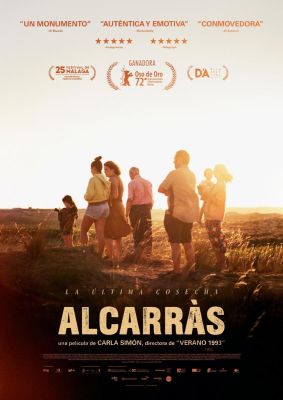 Alcarràs (2022)
Alcarràs (2022)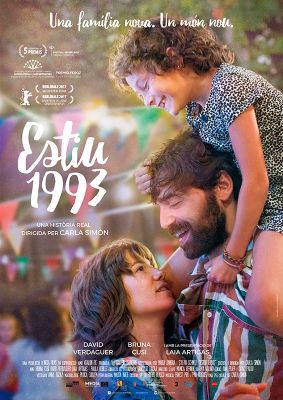 Estiu 1993 (2017)
Estiu 1993 (2017)
The newsletter
Subscribe to our newsletter to keep up to date with Barcelona Metròpolis' new developments



